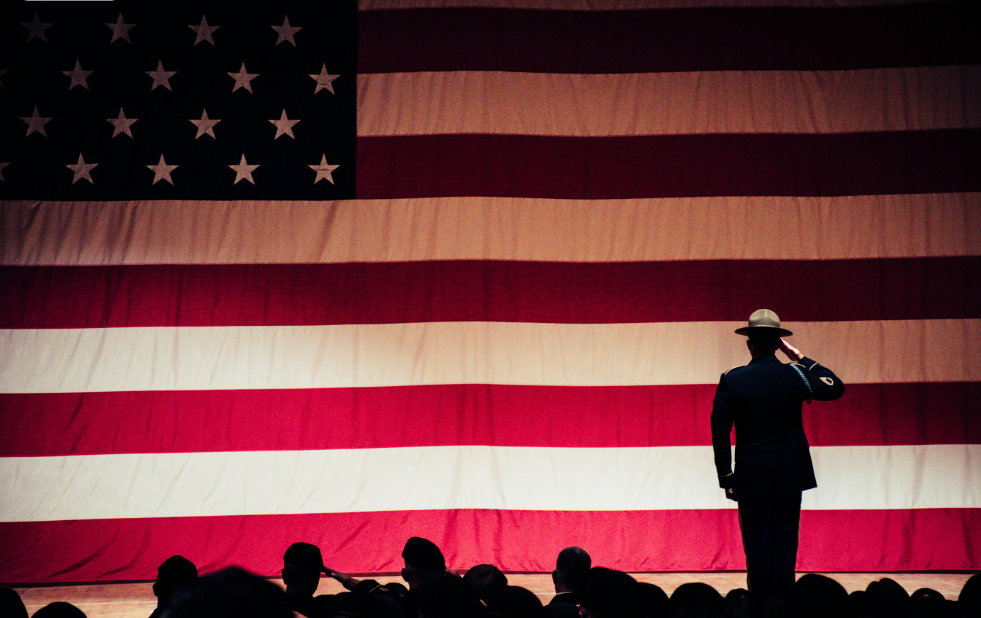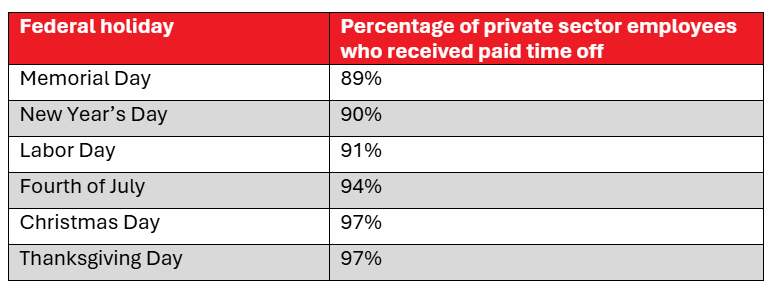
Federal holidays don't apply to all workplaces, but HRD shares ways to make these part of your recruitment and retention policy. Read on to find out

Updated: 20 Jun 2025
Federal holidays first started in 1870 when Congress passed a law creating the first four federal holidays: New Year’s Day, Independence Day, Thanksgiving, and Christmas Day. The list expanded over the years, with the latest federal holiday being added in 2021.
While federal holidays are widely recognized, they only apply to federal government employees. Private sector employers aren’t legally required to offer time off or holiday pay. But should they? What are the benefits of doing so?
In this article, we’ll go over how federal holidays work and how they might differ from state holidays. We’ll make a case for how all employees, regardless of where they work, can benefit from having paid time off or other incentives during federal holidays.
Under federal law, the United States has 11 permanent federal holidays, 12 including Inauguration Day. Here’s a list of these holidays for 2025:
|
Federal Holiday |
Date |
|---|---|
|
New Year’s Day |
January 1 |
|
Martin Luther King Jr.’s birthday |
January 20 |
|
Inauguration Day |
January 20 |
|
George Washington’s birthday |
February 17 |
|
Memorial Day |
May 26 |
|
Juneteenth National Independence Day |
June 19 |
|
Independence Day |
July 4 |
|
Labor Day |
September 1 |
|
Columbus Day |
October 13 |
|
Veterans Day |
November 11 |
|
Thanksgiving Day |
November 27 |
|
Christmas Day |
December 25 |
Let’s have a quick look at the significance of each federal holiday:
The holiday is taken on the day it occurs, even if it is in the middle of the week. The New Year's Eve celebration in Times Square has become a famed gathering, where New Yorkers and tourists alike flock to the city for the iconic ball drop at midnight.
This federal holiday is observed every third Monday in January. It honors the life and legacy of Martin Luther King Jr., one of the most influential and prominent leaders of the Civil Rights Movement.
On this federal holiday, the president-elect and vice-president-elect are sworn into office at the US Capitol building in Washington, DC. Inauguration Day happens every four years on January 20, or January 21 if the 20th falls on a Sunday.
Not all federal employees qualify for paid time off on Inauguration Day. Complete details are in guidelines issued by the US Office of Personnel Management (OPM).
Also known as Presidents’ Day, Washington’s Birthday was initially celebrated on February 22 from 1885 until changes were made in 1968 by the Uniform Monday Holiday Act. The day of celebration officially became the third Monday in February each year.
In 1866, federal workers desired a day to honor the men and women who died in the long and bloody Civil War. On May 30, 1868, Decoration Day was introduced as its official day of observance.
The holiday’s name changed in 1882 to honor all soldiers who died in previous wars. The Uniform Monday Holiday Act in 1968 also changed the holiday to the last Monday in May.
This holiday marks the day when Union troops arrived in Texas to declare that all slaves were free. This happened in 1865, two years after Lincoln’s emancipation declaration. Juneteenth – June 19th, 1865 – is recognized as the day when slavery ended in the United States.
In 2021, President Joe Biden signed Juneteenth into law, the first federal holiday recognized in the 21st century.
On July 4, 1776, the Declaration of Independence officially cut ties with England and formed a newly independent nation: the United States of America. Fourth of July celebrations are marked by fireworks, barbecues, and picnics with friends and family.
On September 5, 1882, the first Labor Day parade was held in New York City with over 20,000 workers marching down Broadway. Labor Day pays tribute to and celebrates the labor of workers and gives them a day to relax with their families.
For American students and educators, the holiday marks the end of summer and the beginning of the new school year. Labor Day is held on the first Monday of September.
Columbus Day, celebrated on the second Monday of October, marks the first voyage of Christopher Columbus. He traveled west from Spain in 1492 and reached the islands of present-day Bahamas. This would later be known as The Discovery of America.
In recent decades, many states and cities have replaced Columbus Day with Indigenous Peoples’ Day.
Originally known as Armistice Day, this federal holiday marks the end of World War I and is celebrated on November 11th each year. On this holiday, Americans remember the sacrifices of war veterans to ensure lasting peace in the nation.
After World War II, the holiday would be known as Veterans Day.

In 1864, President Abraham Lincoln issued a proclamation to the nation, calling for “a day of thanksgiving and praise for our beneficent Father who dwelleth in the heavens.”
Thanksgiving is a time for family traditions and is often accompanied by a feast to give thanks for life’s many blessings. It is celebrated on the fourth Thursday in November.
While its origins are Christian, Christmas has become a holiday that is celebrated among people of various faiths. The number of people who work on Christmas Day is the lowest of all the holidays.
Federal holidays are days declared under law when non-essential federal employees get paid time off.
A federal holiday doesn’t apply to state government employees unless the state recognizes it as a legal holiday.
Federal holidays do not apply to the private sector, but banks are an exception. They are usually closed on federal holidays because of the limited transactions they can do while the Federal Reserve is closed.
In May 2025, President Donald Trump posted on Truth Social that he would be adding two federal holidays to mark the end of World Wars I and II. But it would take much more than a social media post to make this change. Federal holidays are created through laws passed in Congress.
Federal holidays are paid time off for federal employees. Some federal employees may be entitled to premium holiday pay if they’re required to work on a federal holiday.
Employees in the private sector who work on federal holidays are paid their usual rate. They do not get premium pay for working on a federal holiday. Giving them time off, whether paid or unpaid, is up to their employer.
Federal holidays are implemented separately from state holidays. Here are some ways they differ:
Federal holidays are designated by the federal government; individual states can set their own holidays. These may or may not overlap with federal holidays.
Under the Fair Labor Standards Act (FLSA), private employers are not required to pay for hours not worked. They need not observe federal holidays either. This means that private sector employees can be required to work on federal holidays with no holiday pay.
Different rules apply for states with blue laws, which restrict the opening of businesses on Sundays and legal holidays. Under Rhode Island laws, for example, certain employees:
Find out what laws apply in the state/s your company operates in to make sure you’re compliant.
States with blue laws require certain businesses to close on Sundays and legal holidays. This is a serious compliance issue, so it’s best to consult an employment lawyer for guidance.
Policies on federal holidays and holiday pay are clear-cut for federal government employees. How do private companies handle these matters?
Under the law, they can compel their employees to work on holidays with no holiday pay. But this practice is bound to hurt employee morale and affect productivity.
Here are some ideas on what employers can do:
Common practice among the private sector is to offer PTO for some federal holidays. Here’s some data from the Bureau of Labor Statistics (BLS) from 2018:

Employers are not obligated by law to offer paid time off, but those who do so are a green flag for job applicants. PTO is a sought-after employee benefit, making it an effective recruitment and retention strategy.
To keep tabs on your employees’ PTO allocations, have agile and reliable HRIS and payroll systems in place. Choose from among the best HR software and tech solutions in our special report.
A floating holiday is time off that employers can give their workforce on top of the usual PTO allocations. This allows employees to celebrate a federal holiday that matters most to them. Floating holidays can be paid or unpaid, depending on your company’s policies.
Having floating holidays works well in a diverse workforce that observes a variety of cultural and religious holidays. Here’s a case study of how an HR leader implemented a floating holiday initiative for her employees.
According to a survey, 57 percent of employers grant premium pay to employees who work on holidays. The rest offer other incentives such as time off in lieu or free food.
Another option that’s worth exploring is holiday swapping between employees. The same survey said that 82 percent of employers didn’t approve this practice; there could be a missed opportunity here. Holiday swapping offers several benefits:
These are just some approaches you can take to compensate for work on federal holidays. Find out what works best for your employees – ask them through anonymous surveys or questionnaires. Here’s a list of the best employee engagement software to give you some ideas.
Federal holidays are significant dates in American history. They’re an opportunity for people to come together to reflect on these important events. They offer a much-needed break from work to spend time with friends and family, whether in celebration or in solemnity.
While PTO for private sector employees is not mandated by law, it is common practice – good practice – for employers to offer this. It’s a good recruitment and retention strategy, fostering a sense of goodwill among employees. It’s an effective well-being tool as well, as it combats stress and burnout.
While a majority of employees offer PTO for federal holidays like Thanksgiving and Christmas, there is some room to do better. Talk to your employees to find out what works best for them. Offering PTO or other incentives are a small investment to make in exchange for their contentment at work.
How does your organization treat federal holidays? Let us know in the comments below